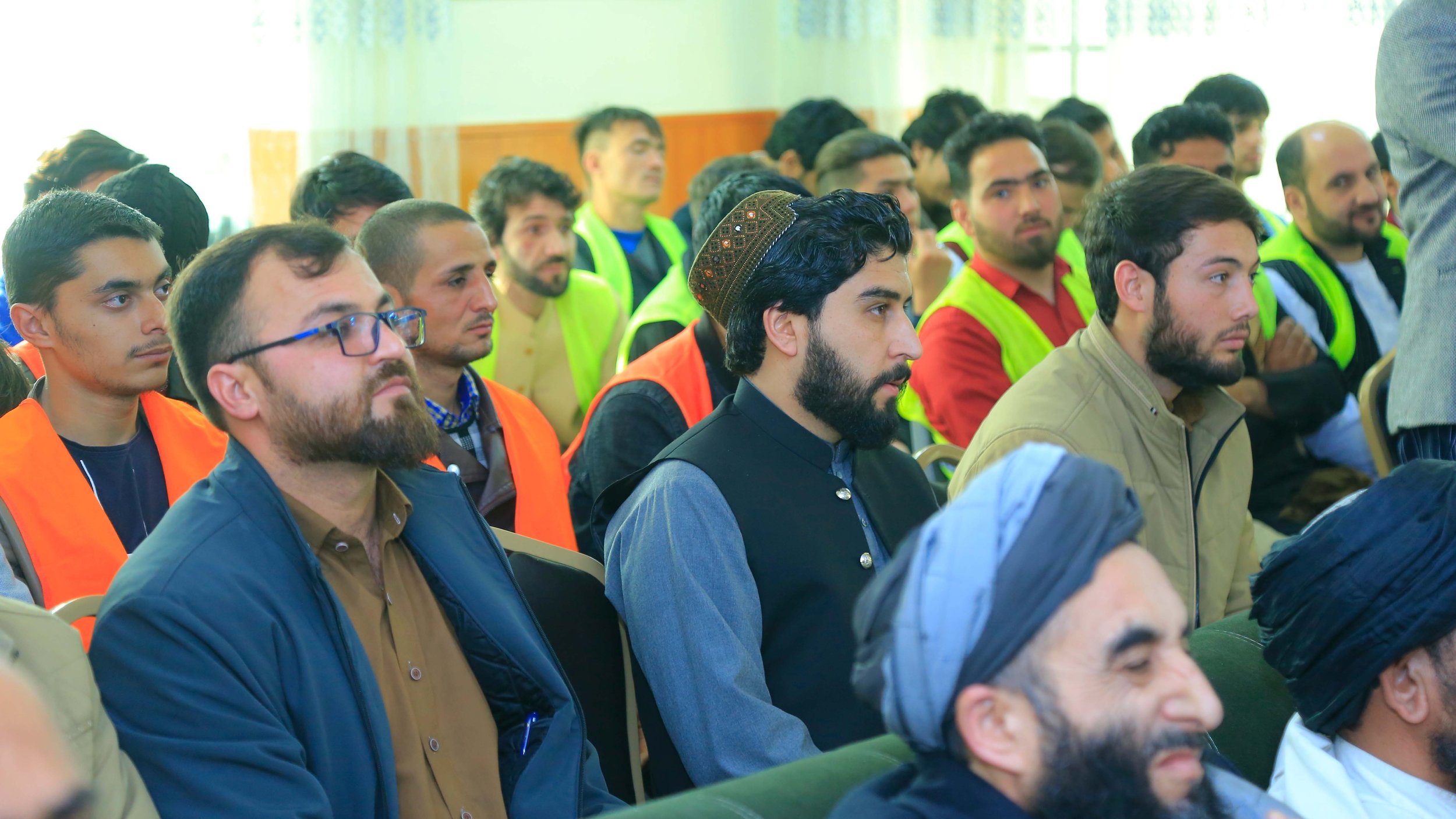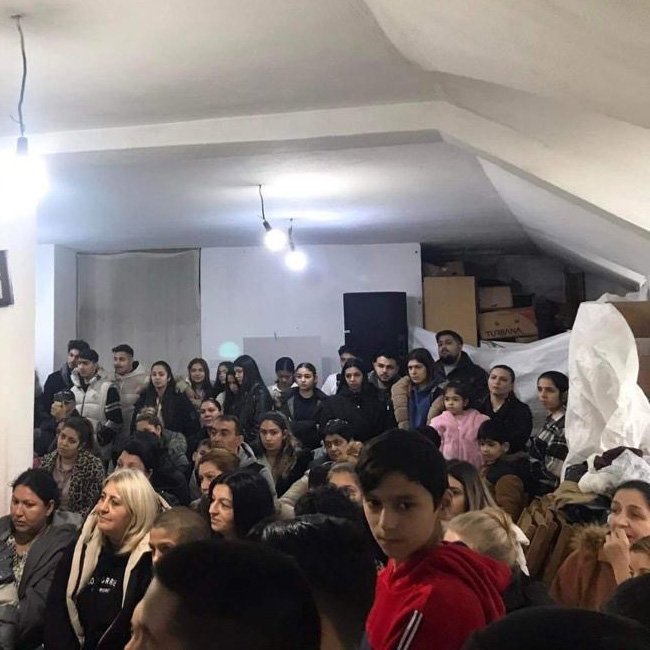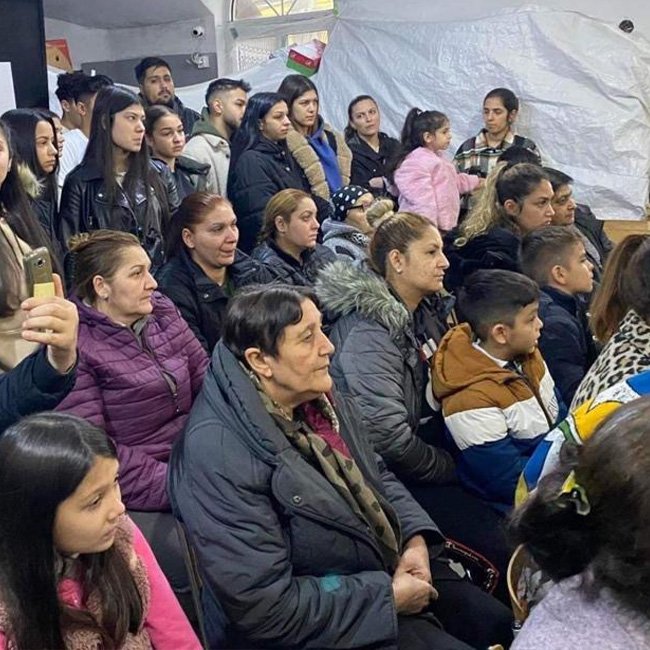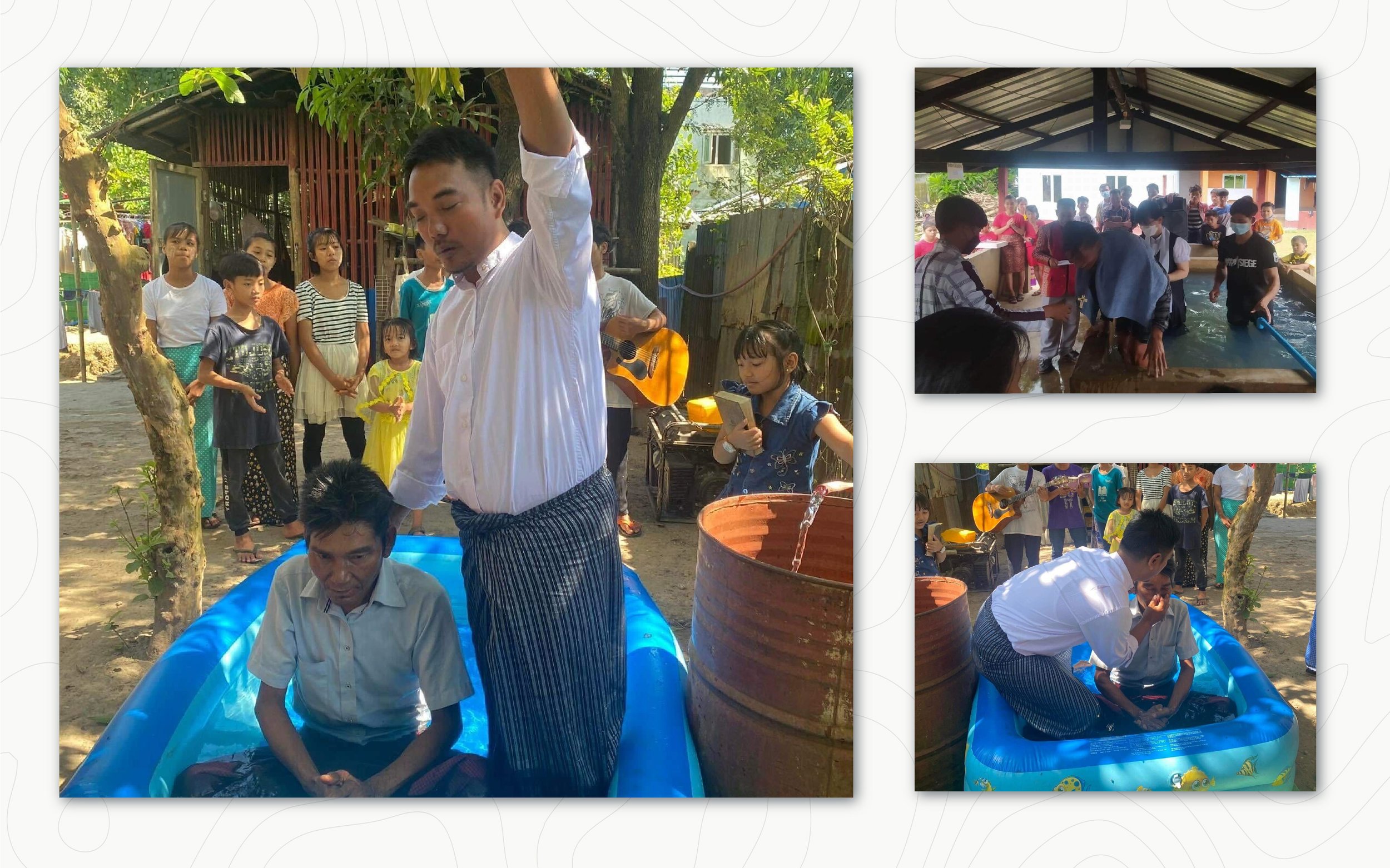Our newest field partner in myanmar
Relationship-building is key to Uncharted’s growth, whether it’s adding Locations or Field Partners. In Myanmar, family relationships are becoming ministry relationships and we’re excited to share about our newest Field Partner there.
Chan Hmung and his wife Su Su have been working to bring the Gospel to their village for many years. The ongoing war forced their family to uproot several times in the past couple years, and they long to return home where they see themselves "doing ministry until we die of old age." Currently Chan Hmung and Su Su live in the town of Laungshee, where they minister alongside their son Jacob, and Jacob’s wife Martha.
Because of the displacement of Myanmar people caused by the war and pandemic, Chan Hmung has become a traveling evangelist, sharing the Gospel in refugee camps alongside local churches. While Chan Hmung has been expanding his ministry, Jacob recently finished seminary in India and he and Martha have a strong call to mission work.
As Chan Hmung moves away from church planting, he has requested to hand off his relationship with Uncharted to Jacob and Martha, who are committed to staying in Laungshee and establishing roots for their family and ministry.
Laungshee is completely Buddhist. Prior to the current situation, no Christians were allowed to live there, but when violence became more widespread they opened the doors to the family, and Jacob has been sharing the Gospel. He said even though their family was forced there by the war, he believes God brought them there.
Jacob wrote, “Before the war, in Laungshee, they didn't allow Christians to rent or live. But God makes a way in times of difficulty. Because of the war, many displaced people came to live in Laungshee. I thought I should take this opportunity to spread the Gospel. Many years ago, there was a missionary in Laungshee. When they became known as a Christian, they cast him out. As for us, they welcome us warmly, only by His grace.”
One of the key aspects of Jacob and Martha’s ministry is hosting English classes young people. Jacob also is working to build relationships and share the Gospel in neighboring villages.
“Whether someone supports us or not, I will be doing ministry in Laungshee. Many people in Laungshee never hear about the Gospel, or in the needy villages around the Laungshee town.
“In order to do Gospel ministry, many servants of God are needed here. So I should be one of them, and I hope and believe that God must have chosen people in this place before the foundation of the world.Hence, I am deeply glad that God has given me a chance to join this ministry, as your fellow worker in Christ.
“And here I am, to stand by, follow the ministry's regulations for the sake of Christ.”
We’re working on finding the right way to stay connected with Chan Hmung, and are proud to have been a part of his expanding ministry. An we are excited to begin our partnership with Jacob and Martha, and continue our work advancing God’s Kingdom in Myanmar.
A Visit to Central Asia
For the first time in nearly two years, Uncharted was able to spend time with our Central Asia partners in person.
For the first time in nearly two years, Uncharted was able to send two staff members to visit our team in Central Asia. The trip was significant for both our staff and our international team, and filled with meaningful moments—including the opportunity to meet some of our Field Partners in person for the first time.
While in Central Asia, our trade school program celebrated a graduation for the electrician program. Each graduate receives a toolkit necessary for the profession, and several students have already started a business together.
Due to changes made by the new government, female students and staff have not been allowed to return to the business and trade programs. Our staff on the ground have been working and meeting with officials in an attempt to gain permission for their colleagues to return. Though the work is slow and frustrating, we are excited to share that female teachers and staff have been able to return to the primary school—thanks to the determination and hard work of our staff in Central Asia.
Update from Serbia
In Serbia, we partner with Bridges United - an organization that trains church planters all around the country. Recently we heard that some of our partners near the city of Vranje had 38 baptisms!
They also had an outreach event where over 50 people attended and made decisions to start following Jesus. Several of our partners have continued to start groups and plant churches in new villages where there are no local churches at all.
As we continue to add new Field Partners in Serbia, keep them in your prayers. One of our partners, Stefen, lives in a difficult location and faces ongoing persecution, which has led to a lot of stress for him and his family.
Myanmar Christmas Parties
Our Myanmar Field Partners accomplished incredible work through their outreach programs in December.
In December, many of our Myanmar Field Partners host Christmas celebrations and outreaches for their communities. The gatherings are usually their biggest events of the year, and have elements of both humanitarian aid and gospel presentation.
Due in part to the Christmas Parties, our Myanmar Field Partners reported that around 6500 people heard the gospel, over 300 started following Jesus, and 38 were baptized in December!
This incredible work comes during times of hardship in Myanmar. The military junta blocks transportation, restricting access to rice and other necessities. And recently, over 1,000 people were forced to tear down their homes and move. As our Field Partners are living in uncertainty and helping their neighbors and church members disassemble their homes, they are still going boldly to proclaim the hope of Christ.
BAPTISMS IN MYANMAR
While Myanmar is still in crisis, our Field Partners there are able to do amazing ministry despite the struggle.
Raj runs a vocational training program as a part of his ministry in Myanmar.
While Myanmar is still in crisis, our Field Partners there are able to do amazing ministry despite the struggle.
In June alone, our church planters in Myanmar helped 50 people choose to follow Jesus and baptized 27!
Many of the church planters have taken initiative to start businesses that give them opportunities to share the gospel and develop relationships. Our partners are starting construction businesses, leading vocational training, and providing English tutoring. As our Church Planter liaison, David, said, "It is really encouraging to see the fruits that our church planters are having.”
Kenneth baptizing a young woman in Chin State
Of the 27 baptisms in June, Kenneth Chan Hmung baptized 20! Kenneth and his family have been ministering in Chin State, an area greatly affected by the war. They have moved from village to village, fleeing violence. But in the midst of this, he is sharing the gospel with many other refugees and young people.
David told us, “You may have already known that most Chin people are Christians, but it is not true at all for young generations. So it is amazing how God is reviving the young generation through some of our church planters."
Though it’s been nearly a year and a half since the military junta took over Myanmar, life has only gotten more difficult. Fighting continues throughout the country, making it dangerous or impossible for kids to go to school. One village is safe while the next village is burned. No one feels safe or settled, but this is just life in Myanmar today.
Recently, our staff prayed Romans 15:13 over our Myanmar partners: “May the God of hope fill you with all joy and peace as you trust in him, so that you may overflow with hope by the power of the Holy Spirit.”
We are burdened by the struggles of our friends in Myanmar, and encouraged by their determination to make disciples in every circumstance. Join us as we continue to pray for hope, joy, and peace in the hearts of these church planters and for the country of Myanmar.
Pray for the safety of our partners and for the flourishing of their ministries.
Pray for health, specifically for Ngun Khen, Duh Peng, and Isaiah.
Pray for the country of Myanmar, that it will be a place of peace once again.
UNCHARTED IN NORTH AFRICA
Uncharted exists to make disciples and plant churches in forgotten and overlooked places. That means going where the work is hard, where progress is slow, and where few others are going.
Uncharted exists to make disciples and plant churches in forgotten and overlooked places. That means going where the work is hard, where progress is slow, and where few others are going. In order to fulfill this great commission, boldness is required—the boldness to be a light in the dark places, and the boldness to go where we are called.
In 2021, Uncharted took steps to Go Boldly in many ways—both in new locations and in our existing Communities. And we want to share with you the steps we take along the way.
Hear all about our new location from our Global Operations Director.
We are excited to share that in 2022, we are launching North Africa as a new Uncharted Location! War and the threat of violence has led millions of displaced Arab refugees to flee their home country for the safety of North Africa. These people come from one of the least reached people groups in the world, and now they live in a safer, more accessible location.
We are partnering with a like-minded organization to launch a team in a major city whose focus is on the displaced Arab refugee population living there. Uncharted is specifically supporting the team leaders—a married couple who is in the process of immigrating to North Africa.
While the work is brand new and not yet started, it’s an exciting opportunity to be getting involved at the very beginning. God has already begun working in the hearts of these people, and there is a lot of potential in the region. Currently the team is looking at the potential to start women’s groups, and is already helping with food distributions.
Pray that the team leaders are able to proceed with the immigration process, that the team continues to learn more about the area they’ll be working in, and for the opportunities for new ministries in the region.
GIRLS' SCHOOL IN CENTRAL ASIA
Since the recent political turnover in Central Asia, many parts of daily life have been limited by the new regime. But girls especially are the most vulnerable and face the most challenges.
Since the recent political turnover in Central Asia, many parts of daily life have been limited by the new regime. But girls especially are the most vulnerable and face the most challenges, including being denied the ability to continue their education.
One of our field partners is helping run an underground school for girls who don’t have access to education or the money to join another course. He asked one student to describe her experience. She said that before she joined the school, “I was always at home, and felt in myself a dark cage and was imprisoned at home.”
Because of the support of the Uncharted community, these girls are able to receive not only material needs, but also hope for their future at a time when everything around them seems hopeless. Thank you for giving girls in Central Asia the opportunity to receive hope, love, and encouragement.
“I was always thinking that everyone in this world is evil and looking to disturb others. But this course changed my perspective. When I knew there are a lot of kindhearted people who are far away from you but feel your pains and try to help those who are in need regardless of race, gender, language, I became hopeful.”
EMBARK: GOING BOLDLY IN 2022
It all begins with an idea.
“Go Boldly” is Uncharted’s tagline for a reason. Uncharted exists to make disciples and plant churches in forgotten and overlooked places. That means going where the work is hard, where progress is slow, and where few others are going. In order to fulfill this great commission, boldness is required—the boldness to be a light in the dark places, and the boldness to go where we are called.
“Go Boldly” is an invitation, and a promise.
In 2022, Uncharted has been given more opportunities than ever to continue to Go Boldly - both in new locations and in our existing Communities. And we want to share with you the steps we take along the way!
We’ve recently been exploring new ministries and partnerships in Serbia! Through connections with our Serbian friends and partners—Danko from Center Church and Laki from Lifegate—we’ve gotten to know a group of church planters in rural areas of Serbia. Many of them are Roma, and primarily work among other Roma people. Many of the people they serve, and the church planters themselves, are poor and their communities are starkly different than the city of Belgrade.
These church planters gather for training and discipleship. As leaders, they are sent out to surrounding cities, where they train other leaders to go do the same. They are living a discipleship multiplication movement, and doing it all with extremely limited resources.
We are so excited to have met these church planters who are already Going Boldly to proclaim the hope of Christ. As we move forward with our relationships and learn what our role can be, we will let you know how you can be praying for and supporting these new partners.
Join us as we embark on a journey of growth and discovery for Uncharted. Pray for discernment as we meet with new potential partners, take vision trips to new potential Communities, and expand existing work. Pray specifically for the church planters in Serbia—that they continue to be empowered to Go Boldly and that we learn the best way to care for them.
NEW PARTNERS IN CENTRAL ASIA
We are so excited to be able to announce new partnerships in Central Asia!
We are so excited to be able to announce new partnerships in Central Asia! When we first joined work in this region, we hoped to help provide humanitarian aid as well as true discipleship for believers in the underground church. Despite a tumultuous year, we’ve been able to see incredible work from our new partners.
Watch the video below from Geoff, our Director of Global Operations, about the kind of ministries our new partners are starting.
We can’t wait to continue to share stories from Central Asia, as well as keep you in the loop about new opportunities in other Communities or new locations! Please pray for our new partners, their ministries, and their continued boldness in proclaiming the gospel.
MYANMAR CHRISTMAS OUTREACH
For our Church Planters in Myanmar, Christmas included ministering at refugee camps, distributing food packages, baptizing new believers, and sharing the Gospel.
For our Church Planters in Myanmar, Christmas included ministering at refugee camps, distributing food packages, baptizing new believers, and sharing the Gospel. CPs usually use the holiday as an excuse to host parties and share the hope of Christ with their neighbors. However, the pandemic and now the government coup has made it difficult to gather their community. This year some CPs were able host outreaches, and were so happy to get back to some normalcy and celebration. Continue to remember these brave men and women, and pray the connections they’re making lead to discipleship multiplication.
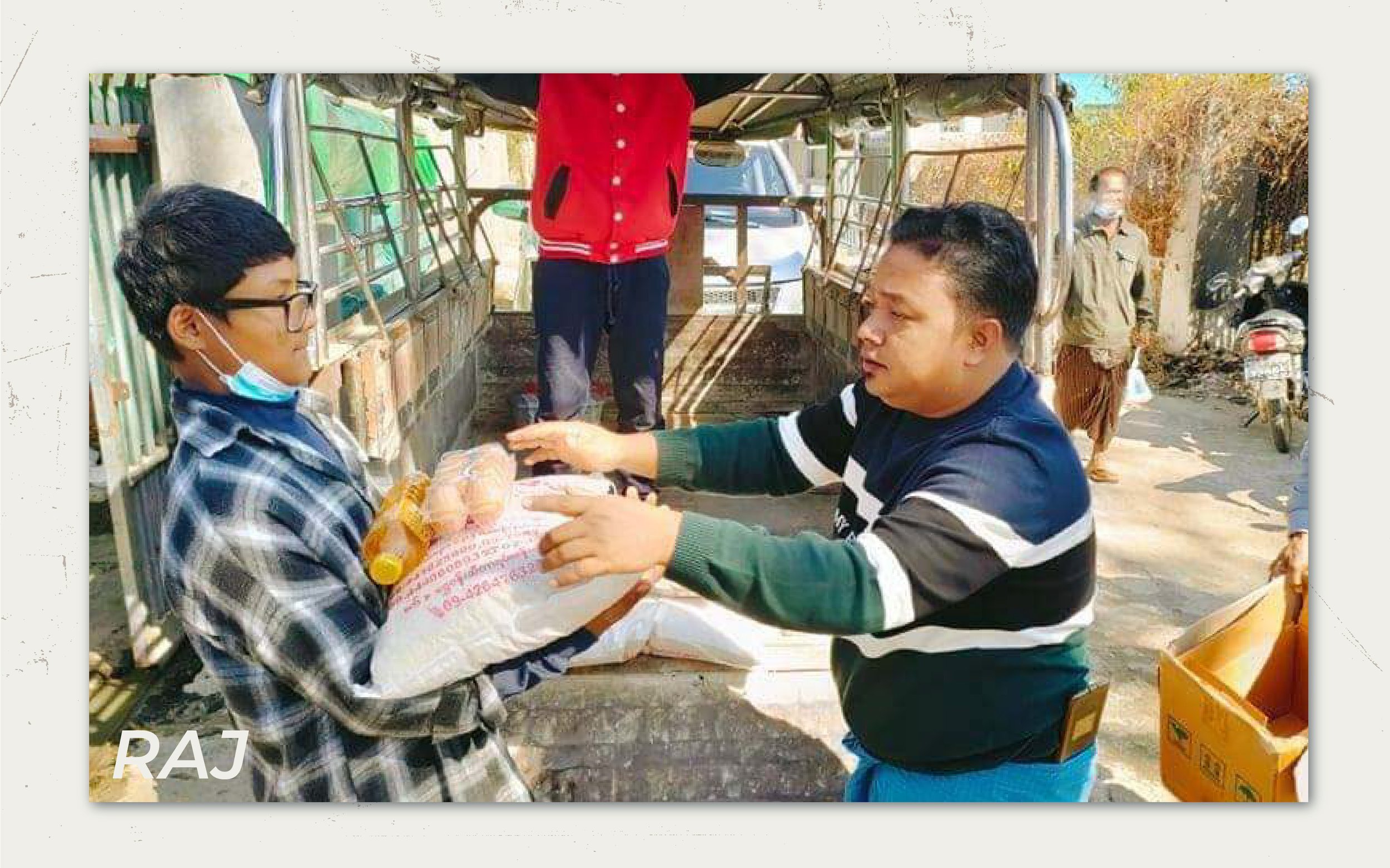

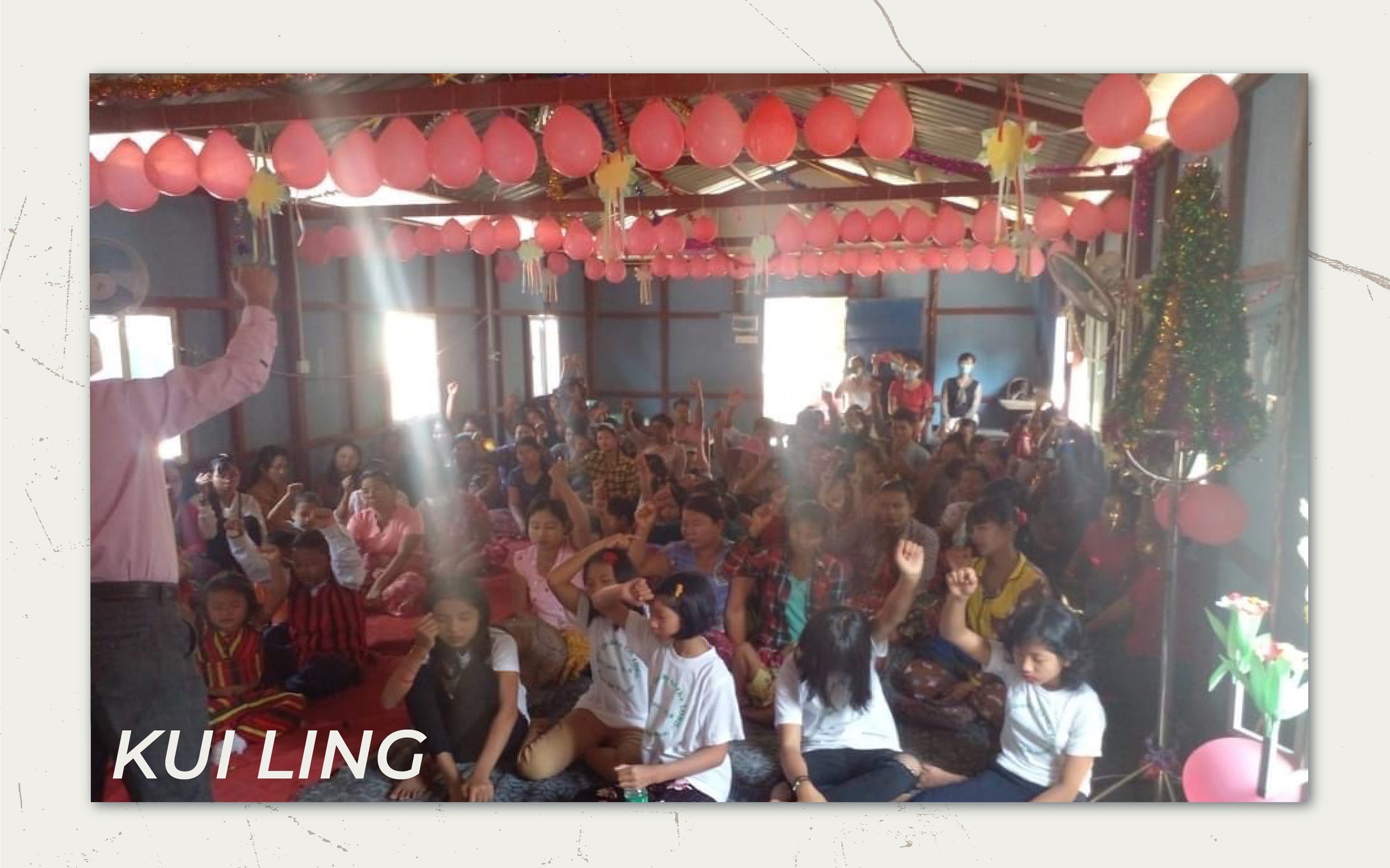

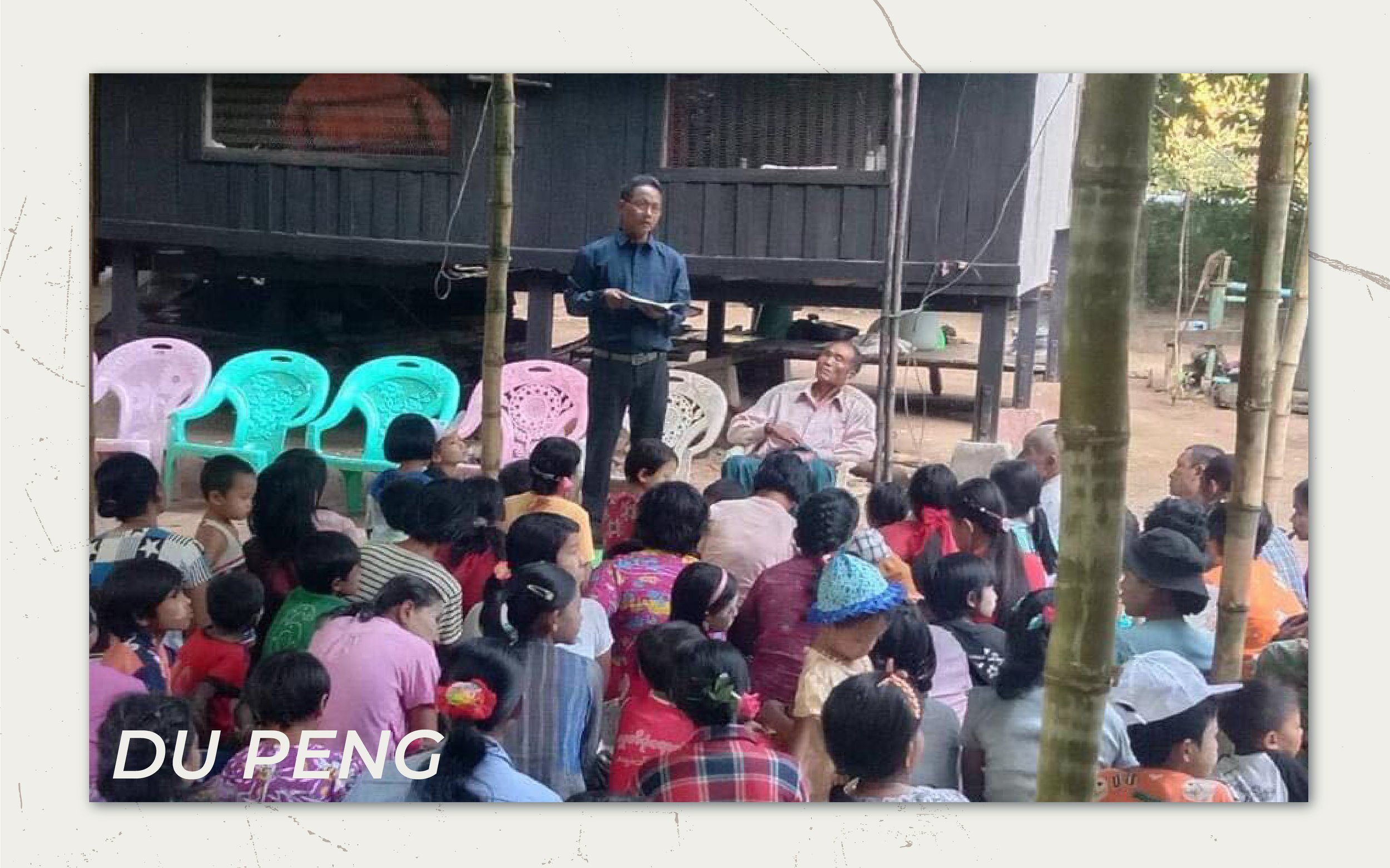
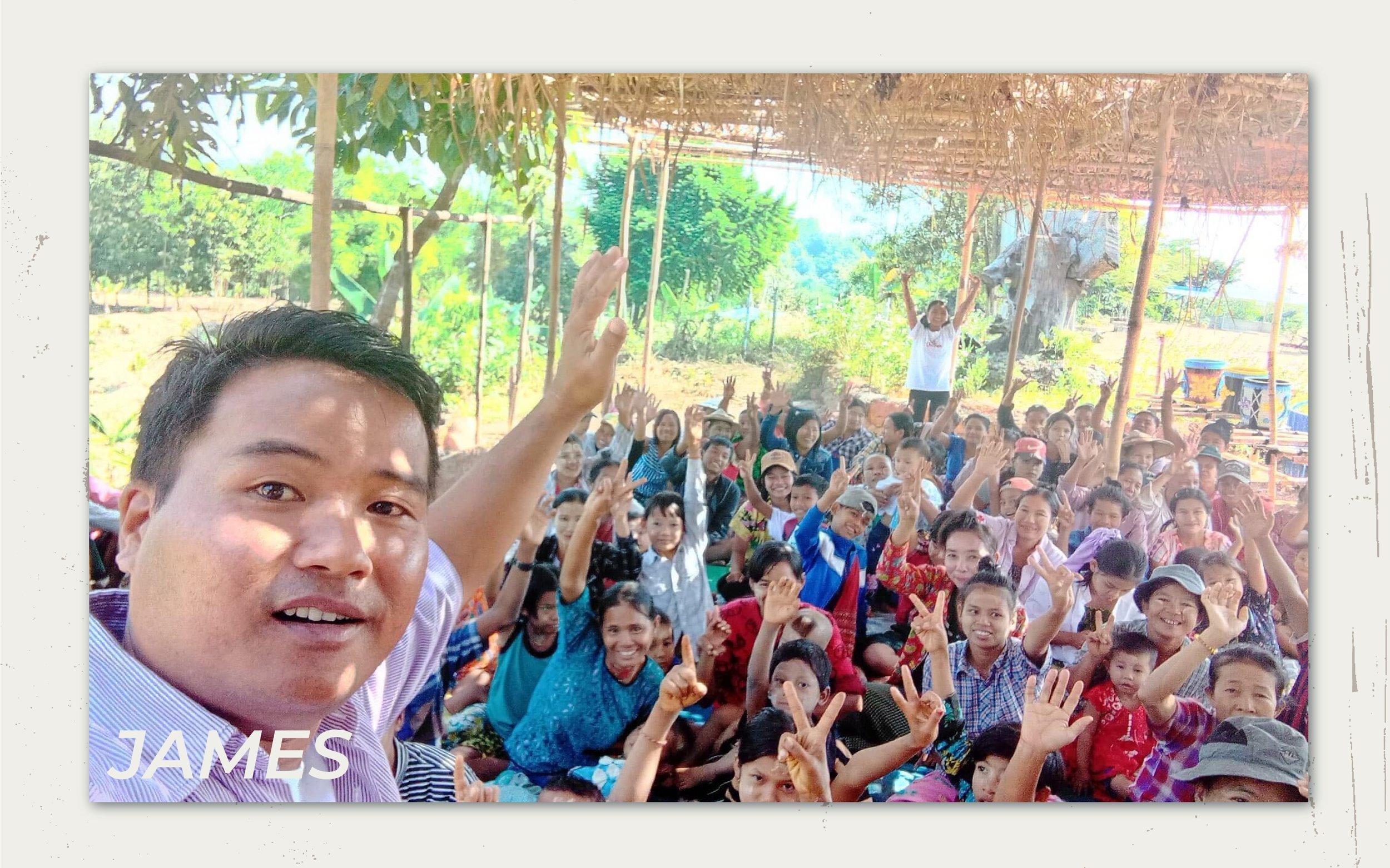
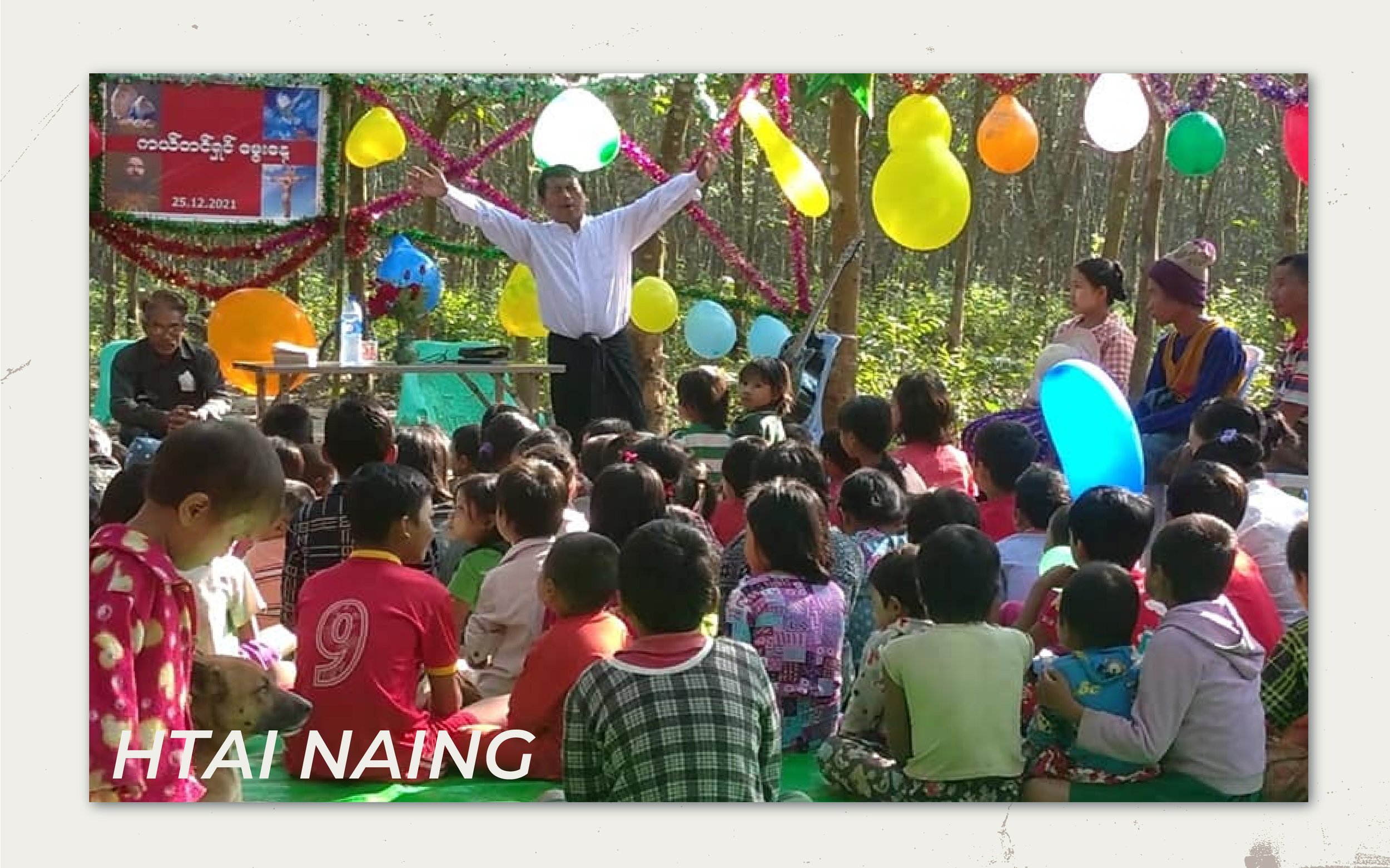
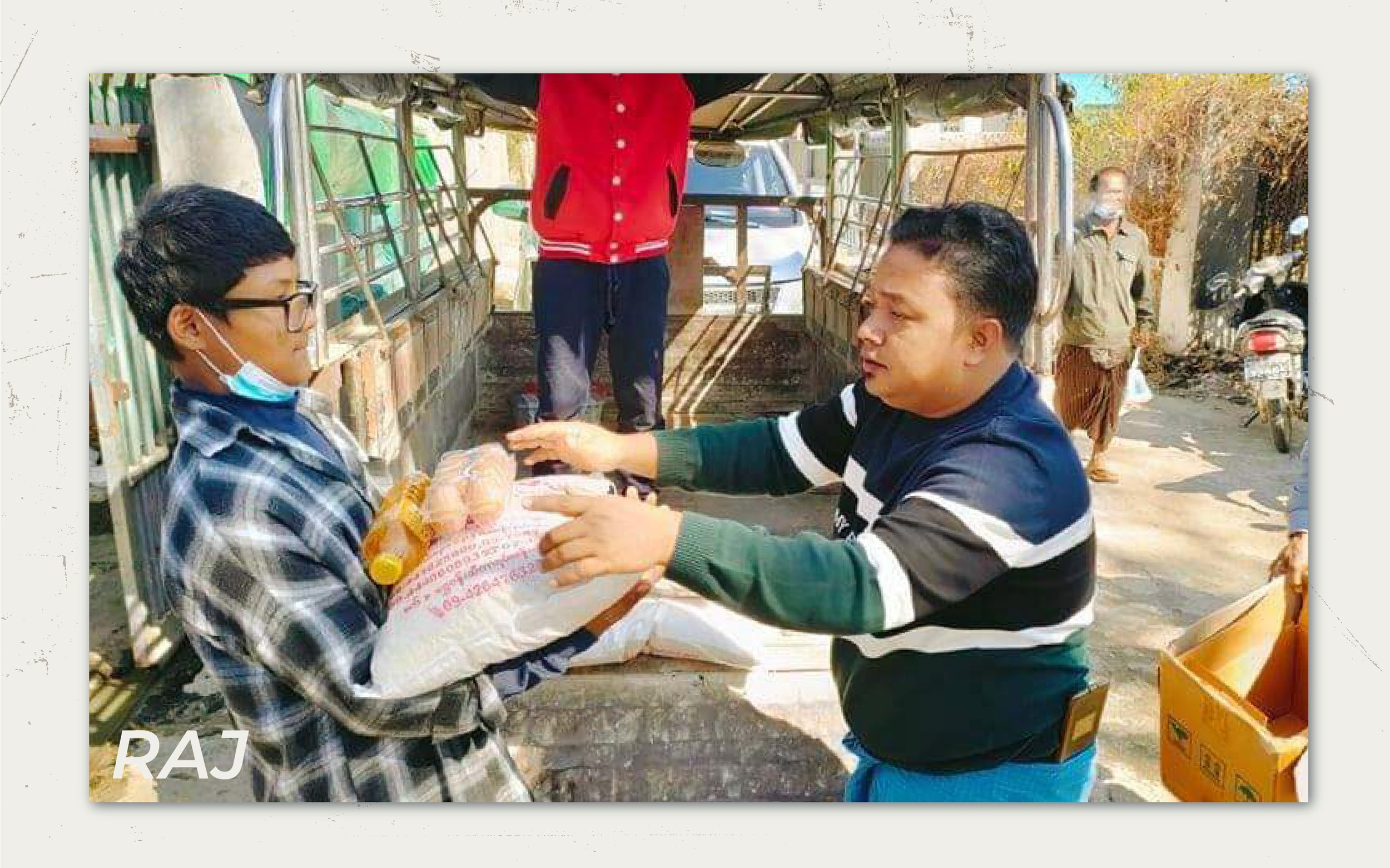
Worth
Seeing someone struggle through a situation you’ve experienced before, it’s completely natural to want to reassure them it won’t last forever. In hindsight, we see our own growth that came from adversity. But not all experiences are universal, and an outcome that you think is worth suffering for may not be worth anything for someone else.
Telling someone their struggle will result in a positive outcome is not only dismissive of their pain, but also raises their expectation for an earthly, proportionate reward. Life doesn’t happen transactionally; you don’t evaluate the cost and ROI of every crisis or difficulty and decide what you’re willing to live through.
“Count it all joy, my brothers, when you meet trials of various kinds, for you know that the testing of your faith produces.” James 1:2-4
This is something that is easy to say and hard to hear, even from someone like James who faced more than enough of his own trials. Is he being dismissive? Is he trying to comfort, or is he trying to teach?
When we view trials as a ‘cost’ for a later prize, our relationship with God becomes transactional. Our actions become motivated in attaining or earning a reward, instead of humility and obedience. Then we wonder what is the point of suffering if we don’t see any results.
But longsuffering, which is a gift of the Holy Spirit, is endurance. It’s an ability to bear hardship without an end in sight. Our faith in God can not be dependent on the assumption that every negative experience comes with an equally positive one. There are going to be times when nothing seems worth the pain you’ll feel.
Scriptures promise blessings on those who are faithful, whether it’s a crown of life or eternity with Jesus. It isn’t wrong to anticipate those blessings, or find comfort in their eventual appearance. But equating those with earthly rewards sets up impossible expectations and invites frustration for our lives as they are now.
Created Good
So God created mankind in his own image, in the image of God he created them; male and female he created them.
Genesis 1:27
When we wonder how we, individually, might reflect God’s character, we tend to think of our kindest personality traits or our unique skills. But if we are created in the image of God, then we reflect his character before any of our actions could. Like a child who resembles her mother, the family resemblance was put in us from the beginning, and while our choices can enhance it they can’t create it.
God created things, and called them good. Before their acts of worship or sacrifices, before any of their ‘good’ works were accomplished, he called them good. That has to be our starting point for how we think of our own goodness, and how we think of others’.
If we are good, it’s because we look like him who is Goodness. There is no room to boast, for it comes from outside of ourselves.
For now we see in a mirror dimly, but then face to face. Now I know in part; then I shall know fully, even as I have been fully known.
1 Corinthians 13:12
Goodness can also be terrifying, like a light that is too bright. When we use our limited understanding to try and see the true, unrestrained character of God, we are looking into the sun. We can’t even comprehend the fullness of it; it’s beyond us. And because we can’t fully understand it, we may not even recognize it.
Our limited definition of “good” usually includes the absence of pain, hardship, or death. It has connotations of pleasance, painlessness, enjoyment, beneficence. It is whatever gives us the most happiness with the fewest hurt. And if we were to judge God’s goodness based on our definition, most of us would say it isn’t usually there. He withholds things we want, allows us to feel pain, and doesn’t always protect us from terrible loss. Either God is not good, or we don’t understand his goodness.
Our concept of goodness is painfully temporal. We have to reframe our perspective to something more eternal.
We already do things all the time that we don’t enjoy, or even cause us pain, precisely because we think it is good. We eat healthy food because it is better to be healthy than sick. We initiate difficult conversations because it is better to be honest and helpful than to be comfortable. It’s like training for a marathon. Pain can be bad, but it can also be good when it means you’re getting stronger.
Just like the pain of physical exertion can lead to strength, God uses painful and difficult moments in our lives to lead us to a higher good. It doesn’t mean those moments were secretly good all along, or that your feelings have been invalidated. Rather, they become reframed in the story God is telling through you.
There is an appeal something higher than our immediate desires or understanding. Just because something is powerful, or maybe even dangerous, doesn’t mean it isn’t good.
The Root of Goodness
“Oh, taste and see that the Lord is good!”
Psalm 34:8
We all make assessments about what is right and what is wrong, what is good and what is bad. It’s an inner conscious, an almost inherent sense of morality. But where does our idea of goodness come from? Most people can recognize it, but it’s harder to define it or draw its boundaries. Why is courage admired and cowardice despised, even for the sake of self-preservation? Why is honesty preferred to deceit, even when it causes complications?
We don’t get to determine what goodness is. Goodness is defined not by earthly laws or human morality, but only by the character of God. It is when things are most aligned with who he is.
Because of the fallenness of the world, because of our freedom to choose sin and selfishness, we are not always in alignment. People and situations can be far from God, and therefore far from good. But God doesn’t change, so that means his goodness doesn’t either. It is not dependent on a positive outcome, a happy feeling, a narrowly-missed disaster. It can be as present in a celebration as it is in a disaster. When we expand our definition, we can recognize it in more places.
“Every good gift and every perfect gift is from above, coming down from the Father of lights, with whom there is no variation or shadow due to change.”
James 1:17
Some people have a hard time awarding something value if it isn’t explicitly from God, however explicitly that could ever be to us, anyway. But if everything good is from God, that means everything, whether or not it is found in a church building.
Goodness comes from a pure love of God, from wanting to be like him and not from wanting to increase our own virtue.
When we are told that ‘goodness’ is something we’re meant to have, that we should be filled to bursting with it, it’s easy to get overwhelmed. We have to confront our weaknesses and decide to act better, and it usually feels like gritting our teeth and trying to force positive vibes. Is that really goodness, though? Jesus rebuked the pharisees who spent their lives trying to check all the right boxes because even though their outward actions seemed ‘good,’ their inner lives were filled with pettiness and corruption.
You can be outwardly ‘good,’ you can be what the world calls ‘good,’ and still be painfully empty of God’s goodness.
The true goodness of God is not something you can earn. But it is something that has already been given to you. It was given to you when you were created in his image, and given again when the Holy Spirit took up residency in you. Like a child takes after a parent, you already have the family resemblance.
Knowing that goodness is a gift and not a prize isn’t permission to stop trying at all. It isn’t a free pass to pursue your selfish ambitions and neglect the work in which God calls us to participate. It is freedom to do the work without the pressure of completing it.
Stop striving and living like you are fully responsible for manifesting the goodness of the Lord in your life. Rest in his provision and peace, knowing that it’s there even when you can’t feel it. Remain confident.
And when he calls you into action, into pursuing him and being drawn close, do not turn him away.
Adjusting to the dark
“Why must holy places be dark places?”
C.S. Lewis
Many times, faithfulness is like being in a dark room. And instead of fleeing, you slowly let your eyes adjust. And just as soon as you can make out a few shadowy objects, you’re lead into deeper darkness.
And all of life can feel like an unending journey into darker darkness. Each room that comes is impossibly dark for a long time, and all of the squinting and straining does nothing. All you can do is sit in the darkness and wait for something else to give you sight.
This is a world where he doesn’t show himself clearly, he only gives us glimpses. He hides himself and his voice, and asks us to believe what our senses and minds say is impossible. We are lead into places we don’t understand.
That uncomfortable darkness reveals our faithfulness, or lack thereof. We are forced to come to terms with the inadequacy of our greatest strength and the failures of our strongest virtues. We are brought to a place where we cannot rely on ourselves, where no light in our world could guide us.
“In this you rejoice, though now for a little while, if necessary, you have been grieved by various trials, so that the tested genuineness of your faith— more precious than gold that perishes though it is tested by fire— may be found to result in praise and glory and honor at the revelation of Jesus Christ. Though you have not seen him, you love him. Though you do not now see him, you believe in him and rejoice with joy that is inexpressible and filled with glory, obtaining the outcome of your faith, the salvation of your souls.”
— 1 PETER 1:6-9
It’s hard to feel excited about faithfulness, when all it appears to be is survival or refinement. Those moments in the dark do not feel very victorious. There is little pride in being pulled through the trials and barely making it by the skin of your teeth. But to be at one’s lowest, to have had sleepless nights and worried days, and still say, “I believe. I trust,” is the whole of faithfulness.
You cannot remove faith from the uncomfortable darkness. It’s understanding the incomprehensible by understanding that you can not understand it. The faithfulness of the Holy Spirit is what empowers us to believe and keep believing.
Same
God’s faithfulness means, in part, that he is who he says he is. Even when we disagree or claim, in ignorance, that what seems contradictory to us must be untrue. The Bible teaches that God is love, but that doesn’t mean he isn’t also just. His goodness is not in conflict with his holiness, or his compassion with his truth. He simply is, and he does not change.
The God that fulfilled his promises to Abraham, Moses, and David is the same God we pray to today. Jesus, who ate with sinners and healed the sick, is the same Messiah we worship now. And the Holy Spirit who empowered the apostles is the same Spirit living in us.
In a lot of ways, God’s faithfulness is expressed when we lack it ourselves. He has promised never to forsake those who love him, and because he never changes, neither does this promise. Nothing we could ever do, say, or experience has the power to drive God away forever. No one is cast off forever, despite our wandering.
If we are faithless, he remains faithful— for he cannot deny himself.
2 Timothy 2:13
In some ways, the faithfulness of God is a culmination of all his other characteristics— it is every virtue fulfilled. Because he is truthful, because he will not abandon us or change his mind about redeeming us, we can rest in knowing that his love his always available. His patience will never run out, his mercy will never end, and his goodness will never be overturned. Our part is to trust that he is who he says he is, and always will be.
“True faith is never merely a source of spiritual comfort. It may indeed bring peace, but before it does so it must involve us in struggle.”
Thomas Merton
Is having faith as simple as making a decision?
A decision is certainly involved. There is a moment where you acknowledge something as truth, a point where commit yourself to something. It is not a matter of fact, a decision resting on rational analysis. Faith is, in part, a belief. But ‘faith’ is not solely the one-time acknowledgment of Jesus as lord. It is not a step you take to move into something else.
Neither is faith simply a feeling. It is not a hope that God exists somewhere out there, or a vague sense that all is right in the world. Feelings are fleeting, and oftentimes heavily influenced by circumstances. A faith that is subjected to constant change isn’t faith at all.
To have faith means to accept that God directs every part of the spiritual life. It’s not the absence of doubt, nor is it an unexplainable experience. It is the man crying out to Jesus, “I believe, help my unbelief!”
I have fought the good fight, I have finished the race, I have kept the faith. Now there is in store for me the crown of righteousness, which the Lord, the righteous Judge, will award to me on that day...
— 2 Timothy 4:7-8
Sometimes it seems like the only thing the Bible has to say about faith is that it will be tested. Among God’s promises for goodness, direction, and purpose are his promises for comfort, strength, and courage during the inevitable times of grief, weakness, and fear.
During Bible times, there were very real, physical trials between a person and their relationship with God. Christians were condemned, turned out by their families, tortured or killed. This still happens in the world today, but barriers to faith in American culture in 2019 look very different. Apathy, selfishness, hesitation to be associated with particular politics, these can keep us from putting our trust in Christ. Not to mention the sharp pain and apparent betrayal of personal suffering.
In times of scarcity, God’s provision is more apparent. In times of uncertainty, God’s promise of direction is better understood. Because of his faithfulness, he will provide all these good things. And our faithfulness is in response to still trusting and believing when those provisions aren’t apparent.
Sent
by Sarah Bourns
I have been stunned as I read through the book of John to notice how often Jesus tells his listeners that He was sent by the Father. It seems that he concludes almost every statement with the qualifier “because The Father has sent me,” and he consistently deflects attention from himself and towards “the One who sent me.”
Curious, I did a little study on the word “sent” in the book of John and found 41 times that it is used by Jesus in this way.
So, why was it so important that Jesus’ disciples knew He was sent by the Father? Is there a difference between going and being sent?
The word Apostle can literally be translated as “the sent ones,” and was often used in political or business language to mean one who acted on the full authority of the sender to the extent that he accurately represented the sender’s mission. Today, we would probably use the term “ambassador” for someone in that role.
Ambassadors can’t send themselves. They don’t go of their own free will; they are only appointed, commissioned, and dispatched by someone else. They are sent to a specific place to do a specific task. They are the audible voice and physical presence of the one they represent.
If we are to understand what it means to be sent by Christ into the world then we need to understand how Christ was sent into the world by the Father.
Jesus was sent in person
God didn’t yell from heaven, “Come back to me!” He first came to us. Jesus not only delivered the Father’s message in person, he was the message as a Person. We, also, are to be sent out in the flesh to the ends of the earth, as the physical embodiment of Christ’s message and presence. May we not expect people to come to us and to our church buildings, but for us to go to them.
Jesus was sent as a Son
He called God his Father. Jesus did not come as an employee, but as a son, in the exact image and likeness of God. His mission on earth was born out of his relationship to the Father. We too have been sent, not as hired hands with only a distant connection to the vision or a vague sense of purpose, but as sons and daughters. We share his mission because we share his DNA. May it be said of us, “Like Father, like son,” and “Like Father, like daughter.”
Jesus was sent as a Servant
God did not wrap his greatest gift to humanity in a fancy package. Instead, he sent Jesus to a small town, to live among poor people, to lead a simple life, and to disciple 12 men for only 3 years. Jesus didn’t need to be a hero. He washed feet, worked as a carpenter, hung out with misfits, and died as a criminal. Not very glamorous or noteworthy. Are we also content to be sent simply, quietly, and without a lot of fanfare? Christ gives us to the world as servants with towels, not as heroes with capes, because he is building his Kingdom, one changed life at a time. May we not assume that we have anything special to offer except Christ in us.
Jesus was sent with power and authority
Jesus knew he had a mission— to bring glory to the Father by redeeming people from every tongue, tribe and nation. He also knew this mission would absolutely be accomplished because God sent his Spirit of power to carry it to completion. Jesus said he did only what he saw the Father doing, trusting that he was anointed with all the power and authority of heaven. And Christ told his disciples that we would do even greater works because we have the same power of the Holy Spirit within us! God doesn’t call us into his mission without fully equipping us for the task and anointing us with his authority. How can we be anything but willing, bold and fearless?
We don’t go on our own initiative; we didn’t dream this mission up. We only do what the Father is doing and go where the Father is working. And how do we know what to do and where to go? Because, before Jesus ever sent his disciples out, he sent the Holy Spirit to reign in each one of his followers.
So, may we confidently go to the ends of the earth, or the end of the street, as those who have been sent.
Passion
by Sarah Bourns
My generation has informally been dubbed the “Passion Generation.” Evidently, we’re full of fire and zeal and a longing to change the world.
I’m exceedingly expectant that because of this great passion, today’s young adults will affect major changes in issues of poverty, trafficking, creation care, disease eradication, racial reconciliation, reaching the lost and more.
But passion alone can’t accomplish long-term fruit.
Movements that are just fueled by righteous indignation and fervor can quickly burn out. Focus gets distorted, leaders go crazy, or they don’t actually accomplish anything except hyping people up.
I’ve seen too many of my friends and students, not to mention myself, be quick to jump on every train that says it’s off to make a difference. It’s just so exciting to take a stand on something that matters!
But if we’re honest, it’s also trendy to be earth conscious, it’s popular to talk about social justice, it’s fashionable to wear Tom’s shoes, and famous people everywhere are giving their money to clean water and AIDS prevention. It’s all the rage really.
And, don’t get me wrong—those are all good things. Praise God that more and more people are finding creative ways to engage our society in helping a world in need.
I just wonder if deep change and lasting impact comes that easily and if it really looks that cool.
We live in a culture that promises quick change, and that we can look good while we’re at it— “Like this on facebook and you’ll feed a hungry family for a week.” “Wear this shirt and you’ll help overthrow an evil war monger.” “Buy these shoes for yourself and you’ll provide shoes for a child in poverty.”
Yes, we can get pretty pumped up about things like this (and maybe more of us should be). But is that all we’ve been called to as followers of Jesus? Is there more to being “passionate” about a cause than donning a wristband?
No one can deny that Jesus was pretty passionate. He threw tables. He drew crowds. He yelled at hypocrites. He started a movement.
But around Easter time when we speak of the “Passion of Christ” what do we actually mean?
We’re referring to Jesus’ deep suffering, his anguish and sacrifice and surrender. His willingness to die.
Jesus’ passion was much more than emotion and enthusiasm; it was gut-wrenching abandonment to the will of His Father, no matter the price he would pay.
In fact, the first definition of the word “passion” in my dictionary is “the sufferings of Jesus Christ from the Last Supper until his crucifixion.”
When Jesus called his disciples to join him in his movement, he wasn’t just asking for a brief commitment or a culture-savvy stance on a hot-button issue.
The kind of passion he ignited in his followers cost them much more than a t-shirt and lasted longer than a passing fad.
Think of all the ways he so openly spoke about the cost of discipleship:
Deny yourself, pick up your cross and follow me
Give away all that you own and be my disciple
The way is narrow and few find it
Hate your father and mother and sister and brother and come follow me
Foxes have holes and birds have nests but the Son of Man has no place to lay his head
Die to yourself
It’s no surprise that many people stopped following Jesus when his teachings got too difficult to swallow or he required more than they wanted to give.
Jesus even asked Peter at one point if he also wanted to leave. And Peter answered “To whom would we go? You alone have the words of eternal life.” (John 6:68)
Ask every one of the 12 disciples (most of whom died for the sake of Christ) if it was worth it to join Jesus, and they would say absolutely yes! The cost was great, but the reward was even greater.
Their lives had no other meaning apart from being caught up in the plan and purpose of Jesus.
These men were the first in our Christian heritage to be part of the unending line of passionate disciples who “loved not their lives even unto death” (Revelation 12:11).
History and present-day missiology confirm that most major advancements of the Gospel into dark places have been fueled by suffering and martyrdom.
And quite frankly, that unnerves me, because I do desperately want to see the unreached experience Christ’s Truth and Light. I would even say I’m pretty passionate about that. But does my passion also include an expectation, perhaps even a longing, to suffer? Can I agree with Paul who said, “I want to know Christ and the power of his resurrection and the fellowship of sharing in his sufferings, becoming like him in his death” (Philippians 3:10)?
Paul’s main (or only?) objective in suffering is that he might know Christ.
He is more passionate about a person, and less about a cause. His desire above all is to draw near to Jesus himself, more so even than bringing others near to Jesus. He would willingly and joyfully suffer because of his love for Christ, not just because of his love for people and especially not just for love of a movement.
I’m learning, slowly but surely, that passion about anything less than the Person of Jesus and his glory can easily fade, disappoint, drain me, or accomplish very little. But as I fix my eyes on Christ and come to know him more, he fuels me with his vision and purpose for reaching his lost and hurting world.
So may we, the Passion Generation, not hesitate to count the cost, take up our cross, and follow Jesus Christ himself, who is infinitely more worthy than the most worthy cause. He alone has the words of eternal life.
Accomplishment & Identity
Over and over and over again, we put on different roles like a layer of dragon skin. Skin other people force on us, skin we wished we had, skin that makes us look like something else. Skin we don like armor to protect the soft, smooth selves within us. We grow into them, or maybe they grow into us. It’s easy to forget these dragon skins haven’t been a part of us forever. But it always gets peeled off, usually painfully.
Relationships end, interests change, people leave. If you have good health today, you are not guaranteed good health tomorrow. When the scales begin to flake off, when we realize this identity we’ve built for ourselves may not be quite as permanent as we wanted, we’re left scrambling for another skin to grow into.
If the statements I use to evaluate my worth aren’t won’t be true in every circumstance, then they can’t be what actually gives me value. Our God-given identity can’t be something that is easily taken away. But if I’m not what I look like, not what I do, not who I know, not where I am, then what am I? What is actually under the layers that I’ve hidden myself in?
You aren’t what you accomplish. It’s good to find joy in your work, to take pride in providing, to be committed to doing whatever you do the best you can. But it’s easy to confuse a list of accomplishments with our inherent value.
Your worth is not in a relationship with your productivity. You are not the money you make or the titles you have. You are neither your failures nor your successes.
Instead, you are a beloved child whose sense of self does not depend on whether or not you’ve failed at something today, or will tomorrow. You have an identity that is not in jeopardy with every mistake, achievement, or crisis.
Jesus moves people from servants to sons. He doesn’t distribute salaries, exchanging fair payment for labor. He gives an inheritance.
Rather than view ourselves as beloved children of the Father, we treat ourselves more like corporations. We try to extract everything of value out of us, judge it against our competitors, and do whatever we can to keep producing something worthy of attention. Like a business, we treat our inherent worth like it has a number attached. And with our successes we see it grow, and with our missteps we see it decline. There is no room for mistakes, but there is also no room for rest or change. Because what is an artist who doesn’t create, or a family provider with no provisions?
When our value comes from outside ourselves, from a relationship that’s been given and can’t be taken away, nothing we do could ever make us less worthy of love. You aren’t your failures. And you aren’t your successes. If it doesn’t matter when you’re at the bottom of the leaderboard, then it doesn’t matter when you are at the top. Finding a sense of fulfillment in your work isn’t the same as hinging your identity on it. But what is it, exactly, that is so fulfilling? Maybe it’s collaboration in achieving a common goal, or participating in a movement you believe in, or completing something to the best of your abilities. But maybe it is also confirmation of the idea that you are worth loving if you can achieve.
This truth, that you are a beloved and cherished son or daughter of God, is not something that’s just there to make you feel better when things fall apart. In the moment of your biggest success, you cannot be made more valuable, more worthy of love, than you are in the lowest of lows. Because your identity is not in a relationship with what you do. Because you are already, in every moment, loved beyond comprehension.
Significance
Jesus’ life was a balance between natural and supernatural. It’s not a stretch to assume the majority of his life was spent in small, ordinary ways. He was a man from a small town who learned a trade. The gospels are full of stories of the seemingly non-miraculous next to the miraculous. Jesus made blind men see, and he got thirsty and tired. He multiplied fishes and loaves, and he listened to his friends’ petty fights. He follows the Resurrection with breakfast by the sea.
Most of us would probably value being witnesses of the Resurrection over breakfast. We attach more purpose, more meaning, to signs and wonders. And when we think of our own purpose and meaning, wondering what God may do through us, we’ve been taught to have high expectations of what is to come. There is some incredible thing God can only do through me, and ‘incredible’ has come to mean exciting, adventurous, loud, world-changing. We started seeing some lives as fine and others as better. ‘Normal’ became a synonym for ‘insignificant.’
When we learn that God ‘calls’ people, we assume he calls them all to action. And we are ready to leap forward and accomplish, achieve, fight battles. Ambition becomes a virtue. What happens if he calls us to something quieter?
In the 1960s, a pastor named Gordon Cosby was leading a successful church in Washington DC and receiving invitations to speaking engagements all over the country. And while he was teaching discipleship and extending his church’s ministry, he was having trouble maintaining the local work of pastoring. As he was deciding how to go about this balancing act, he heard God’s call: Stay home and do your knitting. Stay home, and focus on the community God has put you in.
Knitting turns out to be pretty unexciting. For a pastor, it mostly included listening to people, praying with people, and paying attention to people. But that is how Cosby spent his life.
Members of his church, The Church of the Savior, one of the first interracial churches in then-segregated D.C., launched forty different mission groups and ministries in the city that are still active today. Without someone to tend the orchard, there would be no fruit.
Growth is healthy and necessary for life. Some ministries are meant to get bigger, some people are meant to leave for the ends of the earth. But in many ways, pride disguised as ambition teaches us to be discontent with where we are and the work we have before us. We’re unimpressed by the ordinary. And when we feel defeated by the ordinary and frustrating daily grind, it’s tempting to think that our gifts would shine brighter elsewhere, that I can’t be fulfilling my true purpose if there’s no sense of accomplishment.
What, actually, is it that Jesus asks us to do? What does he say our lives should be like?
After his resurrection, after he eats with his friends on the shore, Jesus asks Peter three questions and gives him three sets of instructions.
“After breakfast, Jesus said to Simon Peter, ‘Simon, son of John, do you love me?’
‘Yes, Master, you know I love you.’
Jesus said, ‘Feed my lambs.’”John 21:15
Feed my lambs. Take care of my sheep.
If we remain strict in our definition of what is sacred and what is not, of what is significant and what is just normal life, we miss the miracles in things like breakfast with friends. We miss the significance and goodness of simple, daily work. Christ is in all of it and holding all of it together. A backyard garden has the same meaning and beauty and mountaintops. Staying home to do your knitting has as much purpose, as much Christ, as any new, loud, or far away. The pressure we may feel to hear our calling, to find the place where we shine brightest, is largely put on by ourselves. What Jesus actually asks of us is to simply care for his sheep.




